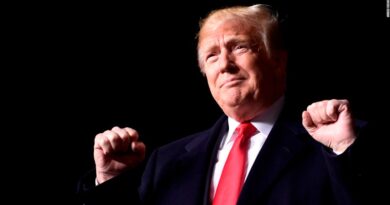Far-right group Project Veritas admits it had ‘no evidence’ of voter fraud in Pennsylvania

The far-right political agitator James O’Keefe and the Project Veritas organization he once led have admitted that they had “no evidence” backing up widely spread claims of voter fraud at a Pennsylvania post office during the 2020 presidential election won by Joe Biden.
O’Keefe and Project Veritas made that admission on Monday after settling a lawsuit filed against them by Robert Weisenbach, the postmaster of Erie, Pennsylvania, in state court, concluding one of the more prominent legal battles spurred by Republican lies that Donald Trump was defrauded out of another term in the White House.
“Neither Mr Weisenbach nor any other [postal] employee in Erie, Pennsylvania, engaged in election fraud or any other wrongdoing related to mail-in ballots,” O’Keefe said in a statement published on Monday on X, the social media platform formerly known as Twitter. “I am aware of no evidence or other allegation that election fraud occurred in the Erie post office during the 2020 presidential election.”
Claims by an Erie mail carrier and Trump supporter named Richard Hopkins thrust his local post office into the center of rightwing conspiracy theories seeking to delegitimize Biden’s victory in the 2020 election. Hopkins maintained in a signed affidavit that he had overheard Weisenbach discuss illicitly backdating mail-in ballots, which overwhelmingly favored Biden after Trump urged his supporters to vote in person instead despite vaccines meant to limit the spread of Covid-19 still not being widely available at the time.
But Hopkins recanted his sworn allegations after Lindsey Graham, the Republican senator who was then leader of the chamber’s judiciary committee, cited them to support his calls for a federal investigation into ballot tampering.
Hopkins sought to cast doubt on his retraction soon after, saying in a YouTube video: “I did not recant my statements.” But on Monday, Hopkins confirmed he was wrong to have besmirched Weisenbach.
“I only heard a fragment of the conversation [involving] Weisenbach and reached the conclusion that the conversation was related to nefarious behavior,” Hopkins said in a statement released along with O’Keefe’s. “As I have now learned, I was wrong. Mr Weisenbach was not involved in any inappropriate behavior concerning the 2020 presidential election.”
Hopkins’s statement alluded to the results of a US post office inspector general’s investigation which cleared Weisenbach and his colleagues of wrongdoing. The statement also apologized to Weisenbach, his family and his post office employees, along with anyone who was “negatively” affected by Hopkins’s falsehoods. “I implore everyone … to leave the Weisenbach family alone and allow them to return to their normal, peaceful lives,” Hopkins’ statement added.
Neither Project Veritas nor Weisenbach’s attorney, David Houck, could immediately be reached for comment. But Houck confirmed to NBC News that Monday’s statements from O’Keefe and Hopkins came after they had agreed to settle Weisenbach’s lawsuit.
Houck did not elaborate on any other terms of the settlement.
“The only comment I’m allowed to make about it is that the case was filed, litigated and settled to the satisfaction of the parties,” Houck said to NBC.
O’Keefe’s and Hopkins’s statements on Monday inspired heaps of schadenfreude in some quarters. A comment on X from Bill Grueskin, who spent six years as academic dean of the prestigious Columbia Journalism school, summarized the general reaction.
“Sorry to take down a couple of your heroes, but it appears that James O’Keefe and Project Veritas got something wrong,” Grueskin wrote while sharing screen captures of Monday’s mea culpas.
after newsletter promotion
Despite Trump supporters’ claims to the contrary, election integrity experts consider the 2020 race to be the most secure ever. In a rare instance of an improperly reported voting result from the 2020 election, a Virginia county confirmed in January that Trump had been awarded 2,237 ballots more than he should have, and Biden was short-changed nearly 1,650.
O’Keefe and Project Veritas earned notoriety for video stings – often involving hidden cameras – which targeted progressives. One of his more prominent stings took down the community activism group Acorn, whom O’Keefe duped by posing as a pimp aspiring to establish a brothel.
Another aimed at US senator Mary Landrieu during her final term in office saw O’Keefe and three associates plead guilty in 2010 to entering federal property under false pretenses. O’Keefe was sentenced to three years of probation and a fine of $1,500.
O’Keefe resigned from Project Veritas in February 2023 after the group’s governing board found that he had “spent an excessive amount of donor funds in the [previous] three years on personal luxuries” and filed a civil complaint against him.
In September, Project Veritas suspended its operations and laid off most of its employees. Then, Hannah Giles resigned as chief executive of Project Veritas in December, alleging that “illegality” and “financial improprieties” in the past had left the nonprofit “an unsalvageable mess”.
The settlement in Weisenbach’s case comes as pro-democracy groups have pursued various defamation lawsuits seeking to hold Trump and his allies accountable for false election fraud claims. Last year, Trump ally Rudy Giuliani was ordered to pay $148.1m to two Atlanta election workers for perpetuating lies that they’d engaged in election fraud. The groups hope the lawsuits show there are consequences to spreading falsehoods that upend the lives of the people targeted by these claims while sending a message to deter others from doing the same in the future.
Rachel Leingang contributed reporting

